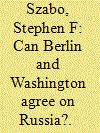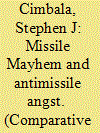|
|
|
Sort Order |
|
|
|
Items / Page
|
|
|
|
|
|
|
| Srl | Item |
| 1 |
ID:
090945


|
|
|
|
|
| Publication |
2009.
|
| Summary/Abstract |
Both Russia and Germany are back on the U.S. agenda. Russia will be a key element of a wide array of policies to the Obama administration, including dealing with Iran and the construction of a broader nonproliferation regime, energy security, nuclear arms reductions, and Afghanistan. Russia policy will also be central to U.S. designs for NATO, including how to deal with Georgia and Ukraine, and the viability of a pan-European security structure.
|
|
|
|
|
|
|
|
|
|
|
|
|
|
|
|
| 2 |
ID:
122941


|
|
|
|
|
| Publication |
2013.
|
| Summary/Abstract |
The political context for nuclear arms reductions, as between the United States and Russia, seemed to stall in 2012 and appeared uncertain as to possible progress during the second term of U.S. President Barack Obama and the third term of Russian President Vladimir Putin. The prospect of a successor agreement to New START that would reduce the numbers of U.S.- and Russian-deployed strategic nuclear weapons to even lower levels was further clouded by Russian objections to U.S. and NATO plans to deploy missile defenses in Europe. The present study considers the political and military aspects of some prospective Obama approaches to post-New START nuclear arms reductions and performs pertinent analysis to consider the relationship between offensive nuclear arms reductions and missile defenses going forward.
|
|
|
|
|
|
|
|
|
|
|
|
|
|
|
|
| 3 |
ID:
137281


|
|
|
|
|
| Summary/Abstract |
This study inquires whether the United States and Russia might be headed toward a new Cold War, at least with respect to certain aspects of their diplomatic-strategic behavior. Those aspects have to do with missile defenses, nuclear arms control, and conflict in cyberspace. Arguments pertinent to these three domains or issues are not necessarily transferable, as interpretations of trends in U.S.-Russian relations, to other aspects of their diplomacy and national security affairs. For example, one cannot necessarily infer the outcome of Russian-American relations over Syria, Ukraine, or Afghanistan based on prevailing tendencies in nuclear arms control or cyber war. Nevertheless, the examination of missile defenses, nuclear arms control, and cyber conflict may yield important insights about near- and longer term prospects, because: (1) each of these issues has been identified by both states as a matter of vital national security interest; (2), each issue offers a challenging mix of technical judgments and policy prescriptions; and (3) U.S.-Russian cooperation is a necessary condition for amelioration of the security risks in each of these issue domains, as well as in their possible areas of overlap.
|
|
|
|
|
|
|
|
|
|
|
|
|
|
|
|
| 4 |
ID:
090922


|
|
|
|
|
| Publication |
2009.
|
| Summary/Abstract |
The triangulation of U.S.-Russian nuclear arms reductions, nuclear abolition, and nonproliferation creates problematical paradoxes and issue overload for the currently challenged policy making processes throughout the international community. Success in Russian-American strategic arms limitation is a necessary condition for further success in nonproliferation, but not a guarantee of eventual success. Interest in nuclear abolition and in missile defenses complicates linear and time tested approaches to nuclear arms limitation, although not fatally.
|
|
|
|
|
|
|
|
|
|
|
|
|
|
|
|
| 5 |
ID:
123553


|
|
|
|
|
|
|
|